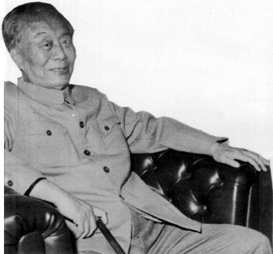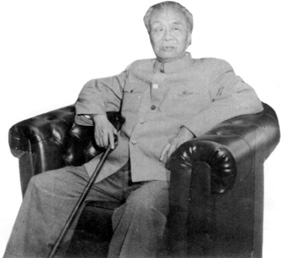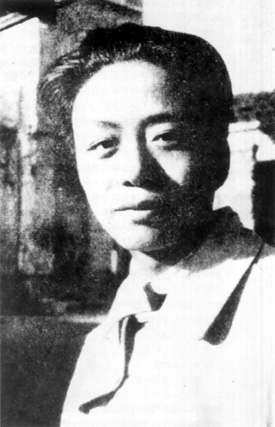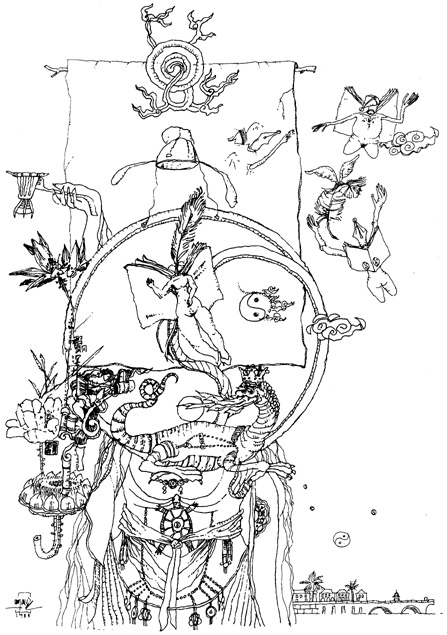RC highlighted the achievements of Ai Qing, considered to be the greatest living poet in China, in its inaugural copy one year ago with the suggestion that he should be proposed for the Nobel Prize for Literature.
We shall remind the reader of the conclusions of that article, an introduction to his autobiography and a small anthology of poetry:
"Not only within the sphere of his poetry but also in his own life he has experienced, throughout this century, greatness and misery, ascents and abysses, a solid mountain standing between the 'sound and the fury' unleashed at his feet, submerged in the winters to blossom again in the springs.
Thus he is a living symbol of Life, the Man who embraces and gives voice to some of the most enduring predicaments of the human condition, and an affectionate compassion for the condition of all living creatures.

Pioneer of the opening up of Chinese culture to western patterns, Ai Qing is today one of the greatest representatives and agents of contact between the Chinese and other nations.
Still living, he is one of the greatest exponents of the world's most ancient Culture, of a vast nation which for the first time in its millenarian history is permitting, in the walls of isolation, an open door to the outside world.
For all of these reasons, for the Poet and his Works, for the Man and what he represents, for the historical opportunity to re-establish the earliest and most primeval culture in this generation of universal fraternal existence, for all of these reasons we regard Ai Qing as a recommendable candidate for the Nobel Prize for Literature."
Throughout the year our proposal had some isolated repercussions, more the result of awakening our readers to an unknown figure rather than a promotion organized by a movement of intellectuals and writers.
It was our expectation, and an inevitability, that this should have a spontaneous result within China.
We now know that the idea had already been born there, based on past suggestions made years ago by those abroad who had some contact with the work of Ai Qing. These suggestions however, fell on barren ground.
In April we received the following letter from Mr. Zhou Hong-Xing, a lecturer in Literature and Ai Qing's secretary: Dear Sir,
The poets Zhou Fi-Fan, Zhang Zhi-Ming, Yau Yi, Suo Sha, Sun Jing-Xuan, Suo Wan-Chao, and myself have presented the Members of the Selection Committee for the Nobel Prize of the Swedish Royal Academy with the name of Ai Qing, one of the greatest contemporary Chinese poets, as a candidate for the 1988 Nobel Prize for Literature.
In addition to ourselves, another fifty intellectuals, writers and poets signed our proposal.
I would like to take this opportunity to offer you my thanks.
By general agreement, I amended the original proposal and then wrote it in English and Chinese and immediately sent it to the Royal Academy.
I am enclosing a copy of the text with a list of the proposers and some supporting comments.
With my best regards.
Zhou Hong-Xing
Beijing, 24-3-88
These are the documents which we are publishing in this issue of RC with a renewed attempt to illustrate how positive solidarity can be created from contact between two cultures and two peoples.
We shall close in the same manner as we did one year ago with particular reference to the Portuguese speaking world:
"From this point in the Far East we should devote ourselves wholeheartedly to the unanimous wish".

Text of the nomination proposal submitted to the Selection Committee of the Swedish Royal Academy.
Dear Members of the Jury for the Nobel Prize of the Swedish Royal Academy:
Ai Qing is one of the most famous names in modern Chinese poetry and his works are veritable jewels not only of Chinese but also of world Literature.
His first collection of poems, The Great Encounter, was published in 1932 and for over half a century his literary life has reflected the various epochs of major significance in the History of China. His life bridges the period prior to the anti-Japanese war up to the present movement towards reform and cultural and political expansion. Ai Qing was present in the anti-Japanese War, the antinationalist revolution, the founding of New China and the Cultural Revolution of which he was, furthermore, a victim.
The life of the poet Ai Qing is intimately linked to the History of China, to his hopes for the Nation and to the future of Mankind. He has said that: " Our personal life, with its joys and pains, must be in harmony with the lives of others and with the social movements which arise in China".
Like many other great poets, he mingles with the workers to try to catch their rhythm, remaining at all times at the centre of social movements. His suggestions and responses are always astute.
In all his wisdom, Ai Qing is himself a reflection of the profound transformations which have taken place during more than half a century of Chinese and world History.
The poet believes that poetry is an "arduous task", we could almost say "suffering". In the early thirties he declared that "I suffered in my capacity as a poet and in my responsibility towards society" but that "even so, I was to continue".
His maxims for life (to be honest) and for work (a poet must speak the truth), as simple as they are sincere, accurately reflect his character.
But sincerity and honour caused great unpleasantness for him during the Cultural Revolution when he was classified as a "pessimist" and condemned as an "anti-revolutionary rightist". He saw his works forbidden and even burned. He was denied freedom of expression and was forced to admit that he was culpable. Humiliated and ashamed, he was compelled to attend self-criticism sessions and was exposed to public criticism and denigration.
Recalling this path of "disgrace" and "suffering" which he had to walk, he declares that: "There was a time in which I had the impression of travelling through a long, dark and damp tunnel without being sure that I would ever manage to escape from it".
In spite of this, Ai Qing never lost hope nor did he lose his interest in what was happening in the field of literature. Poetry is his life and the poet expends all his energy and talents on it. His devotion is complete and the act of creating poetry is what drives him on.
Now, after twenty one years of silence, he has emerged in all his glory, brimming with inspiration and activity. His poems are more perfect in form and reveal greater depth.
In five decades of life and five decades of poetic creation he has produced countless works: lyrical poems, narrative poems (such as "Towards the Sun" and "Hymn to the Light"), short poems, essays, speeches, notes, dialogues, stories, novels and other prose works.
In Chinese he has published nineteen anthologies of poems, fourteen works of selected poems, seven collections of essays, one collection of prose works, one anthology of "true stories" and an anthology of translated poems. In the Beijing Library, the largest library in China, there is a collection of over eighty of Ai Qing's literary works in different editions. His works are valuable items of which "River Dayen, my wet nurse", "Carbon Dialogue", "Snow falls on China", "Beggars", "Towards the Sun", "I love this land", "Bugler", "Torch", "Dawn Message", "Spring Child", "Cliffs", "Hymn to Light", "The Sand of Ancient Rome", etc. deserve special attention. Some of them have been selected as school texts and many others have been presented in festivals and recitals or in musicals on the radio and television.
During the Sino-Japanese war, countless numbers of people read his poetry. Young people copied down his poems, poems which opened the path to the anti-nationalist revolution. During the ten years of the Cultural Revolution there were also many who read and hid the works of Ai Qing at the risk of their lives. Nowadays, Ai Qing, remains one of the poets most revered and respected by poetry lovers. His poems "Song of the Return" and "The White Campanula" were awarded prizes in a poetry competition in China.
During those ten years of Cultural Revolution, Ai Qing followed a long and difficult path of poetic creation, exploring new forms and putting new models into practice in an ceaseless attempt to attain perfection.
Ai Qing was the first Chinese poet to use and spread the idea of free verse and he has become a model and master for many other poets.
The poet Lu Yuan made the following comment on this matter: "Free verse is inextricably linked to the 5.4 Movement* (cf. NB.) and after undergoing a slow and complicated process over thirty years it developed into an extremely important poetic form and a fundamental vehicle in the Chinese cultural movement".
The writers in the 5.4 Movement recognize the enormous influence which Ai Qing's poetry has had on them. In the foreword to his book "White Flower", the poet Lu Yua makes the following comment on Ai Qing's use of free verse: "His poetic creations won over the Chinese people with their mastery and brilliance".
Ai Qing remains one of the best poets in the 5.4 Movement and he is the most famous worldwide. His travels abroad have taken him to Europe, Asia, North and South America. His work embraces universal themes, reflecting man's preoccupations and anxieties while revealing what Truth, Goodness and Beauty exists in the heart of man. His rejection of lies, evil and ugliness is a constant theme in his work and has won him acclaim and recognition from many foreign readers.
An American reader wrote to him saying: "I am a doctor and you a poet but I would go as far as to say that the true doctor is you and not I. With your poems you heal, save and open new horizons on life".
This letter is proof of esteem and respect for the great Chinese poet.
Ai Qing's work has been translated into many languages including Portuguese, English, German, French, Italian, Spanish, Finnish, Czeck, Bulgarian, Hungarian, Rumanian, Polish, Serbo-Croat, Indian, Thai, Nepalese and Malayan. Among the various countries which have published his books are the United States of America, France, the Soviet Union, Sweden, Italy, Spain, Japan, Thailand, Malaysia, Nepal, Brasil, Portugal, South Korea and Chile.
The famous poet Pablo Neruda said of him: "Ai Qing is the best Chinese poet; he is truly a marvellous poet". The American magazine "Newsweek" classified Ai Qing as "the prince of Chinese poets". The Japanese translator of the poetry anthology "Reed Pipes" remarked: "Ai Qing is the brightest star in the sphere of modern Chinese poetry and his works do not belong only to China: they belong to the whole world".
On the 12th of March, on behalf of the President of the Republic, the French Ambassador decorated the poet Ai Qing with the medal of French Literature and Art in recognition of his success in the field of poetry and of his contribution towards peace, friendship amongst men and harmony between the peoples of the world.
Many voices are now heard calling for the Nobel Prize for Literature to be given to Ai Qing. On the 3rd of March, 1985, the Spanish writer Gomez declared: "On several occasions and in several places I have suggested that Ai Qing should be nominated for the Nobel Prize for Literature. I believe this poet and the Chinese people deserve the prize. The honour for Ai Qing would be an honour for the Chinese people".
At the beginning of 1987, the first issue of Review of Culture (Macau) published an article titled "A Nobel for Ai Qing" from which we quote a reference to the poet: "Thus he is a living symbol of Life, the Man who embraces and gives voice to some of the most enduring predicaments of thehuman condition, and an affectionate compassion for the condition of all living creatures".
During a welcome dinner given by the Chinese Ministry of Culture on the 1st of August, 1987, the Brasilian writer Jorge Amado said: "The Nobel Prize for Literature should be given to the great poet Ai Qing".
We believe that to award Ai Qing with the Nobel would also be to contribute to the development of Arts and Literature in China and to promote cultural exchange between people throughout the world.
With our best regards...
List of Proposers
Bing Xing: Authoress; Vice-President of the Federation of Writers and Artists of China.
"Ai Qing deserves a Nobel Prize."
Feng Zhi: Poet; Teacher and Vice-President of the Writers' Association of China.
Bian Zhi-Lin: Teacher, translator and poet.
Yuan Ke-Jia: Teacher, translator and poet.
Wang Mong: Author and Minister of Culture of the People's Republic of China; Vice-President of the Writers' Association of China.
Nie Hua Lin: Chinese naturalized in North America; Coordinator of the Iowa International Writers Centre, U. S. A..
Wang Jing-Ihi: Poet and Director of the Lu Ban Poetry Association.
"Ai Qing describes the Chinese people and their lives. His poetry expresses the aspirations of the Chinese people".
Zhu Zi Qi: Poet and teacher.
Gong Mu: Poet and teacher.
Bao Chong: Writer and teacher, Secretary of the Writers' Association of China.
"Ai Qing is an excellent poet whose works are read and loved by all the Chinese people."
Li Qi-Ye: Teacher; President of the Tian Tin Federation.
"I give all my support to Ai Qing's nomination for the Nobel Prize."
Wu Zhu-Guang: Playwright; Vice-President of the Association of Chinese Playwrights and Composers.
Lu Jian: Poet.
"I lend all my support and sign this list supporting Ai Qing's nomination for the Nobel Prize because I believe this poet is exceptional not only in China but in all the East."
Yuan Ying: Authoress; Member of China's "International Pen-Club".
Wang Zuo-Liang: Teacher and Editor in Chief of "Foreign Language" magazine.
Zhang Zhi-Ming: Poet; Editor in Chief of "Poetry" magazine.
Zhou Di-Fan: Poet.
Yan Yi: Poet; Editor in Chief of "Chinese World" magazine.
Luo Sha: Poet.
Zhou Hong-Xing: Poetry critic; Author of the biography The Life and Works of Ai Qing; Rector of the University of Human Sciences in Beijing (correspondence course).
"I take great pride that Ai Qing and his poetry should be part of the cultural heritage not only of China but of all the world."
Luo Han-Chao: Poetry critic; Author of Ai Qing.
Ke Yuan: Poet; Chief Editor of "The Hua Xia Poetry Journal".
"Ai Qing has always had a great influence on my own poetry."
Wang Ji-En: Teacher; President of the Institute of Ancient Documents of Zhong Shan University.
Wei Li: Poet and critic.
"I totally agree with the letter being sent to the Selection Committee for the Nobel Prize".
Liur Zai-Fu: Critic of literary theory; President of the Literature Institute and of the Chinese Academy of Social Sciences.
Zhou Zhen-Fu: Researcher on Classical Chinese Literature; Editor in Chief of the China National Press.
Hou Jin: Assistant Professor; Editor in Chief of the Dictionary of Chinese Poetry.
"The fruit of half a century of creative productivity, his poetry is an example of excellence to be followed by future poets."
Li Yuan-Luo: Poetry critic.
"If the judgement is unbiased, the Nobel Prize for Literature will be awarded to Ai Qing".
Dai Yan-Tian: Poet; Editor in Chief of "Poetic Gods" magazine.
"Justice will have been done if the Nobel Prize for Literature is awarded to the outstanding poet Ai Qing"
Han Guan: Poet and researcher.
Ou Wai-Ou: Poet; Ex- Editor in Chief of the Editorial Office of the China National Press (Canton section).
Li Ying: Poet; Member of China's "International Pen Club".
"I fully support Ai Qing's nomination. "
Zen Ming-Zhi: Teacher and Interim Director of the "Wen Hui Newspaper".
Fei Xia: French sinologist; Translator of Selected Poetry by Ai Qing.
"Ai Qing's poetry is universal; it reaches and moves all poets."
Yang Kuang-Han: Poetry critic; Author of A Biography of Ai Qing.
"Ai Qing is the greatest oriental poet of the century."
Sun Jing Xuang: Poet.
Tang Shi: Poet.
"Ai Qing's poetry is a universal heritage."
Mo Luo: Poet.
"Ai Qing's poetry is for all of mankind".
Jing Jiang: Poet.
"Ai Qing's poetry is a universal heritage."
Li Qing: Poet; President and Editor in Chief of "Poetic World" magazine.
Lin Qing: Poet.
Chen En: Philippine poet.
He Quan: Philippine poet.
Yun He: Philippine poet.
Li Zhi-Hua: French sinologist.
Hung Yu-Shun: Translator of the anthology of poems Cliffs by Ai Qing.
"Through his works Ai Qing has contributed not only to the poetry of China but also to that of the whole world. His beautiful poems flow from the bottom of his heart and intoxicate the reader's heart. His poetry reflects his character and his profound humanity."
Suzanne Bernards: French sinologist; Translator of Selected Poetry by Ai Qing.
"Ai Qing's work belongs to Humanity."
Nicolai Fedelin: Russian; Editor in Chief of "Literaturnaya Gazeta".
"The Nobel Prize for Literature should decorate the wonderful Chinese poet, Ai Qing".
Che Si-Yin: Malaysian poet; Editor in Chief of the newspaper "Man Yang Commerce".
"From the Sino- Japanese War to the Second World War, the poet Ai Qing extolled human goodness, justice and heroism. His poems encouraged thousands of people to fight for human liberty and dignity."
Li De-Yuan: Editor in Chief of the "Singapore Daily".
"I fully support Ai Qing's nomination for the Nobel Prize."


ILLUSTRATION BY CARLOS MARREIROS
* (NB) The 5.4 Movement is a literary-artistic movement which was formed by some avant-guard writers of the thirties in China. Its name comes from the fact that the group was born on the 5th of April (5.4).
start p. 34
end p.